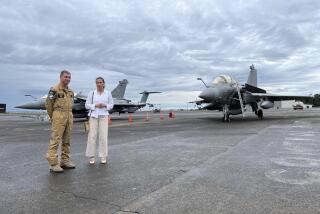Gulf Crisis Alters U.S. View of Philippine Bases’ Value
- Share via
MANILA — The future of the largest and oldest U.S. military bases overseas, both of them here in the Philippines, may hinge on the Persian Gulf crisis.
With new negotiations on whether to extend leases for the bases now scheduled to begin on Sept. 10, analysts say the rapid U.S. military mobilization has forced Pentagon planners to refocus on potential uses for Clark Air Base, Subic Bay Naval Base and four smaller military facilities.
At the same time, America’s only former colony has tried to distance itself from the U.S. military buildup in the gulf. President Corazon Aquino has said little about the crisis other than to publicly insist that the United States must “consult with us” before using the bases to stage combat operations.
Preliminary talks on the bases last May occurred amid a sharp reduction in superpower tensions and resulting pressure in Washington to cut military spending. Chief U.S. negotiator Richard L. Armitage repeatedly threatened to abandon the bases if the Philippines focused solely on obtaining higher compensation.
U.S. officials say the gulf conflict has reinforced Washington’s view that the bases are key to U.S. security and regional peace by protecting sea lanes and projecting power in the Indian Ocean and Western Pacific.
Aquino has taken no public position on the bases. But one draft proposal by the Philippine negotiating team calls for closing Clark Air Base next year, shutting Subic Bay by 1994 and asking for $600 million a year for the use of Subic Bay. Under the current agreement, signed in 1988, Washington pays $481 million for all six facilities.
The draft calls also for closing Camp John Hay next year. The U.S. military rest and recreation facility, situated in Baguio, was a key staging ground for U.S. rescue operations in last month’s devastating earthquake.
Aquino spokesman Horacio Paredes said Friday, however, that the draft was only a working paper and “not the only option being considered.” U.S. Embassy spokesman Stanley Shrager would not comment. “As far as we’re concerned, it’s not official,” he said.
Aides say that, if the bases are used to mount Persian Gulf operations, Aquino fears repercussions against the estimated 60,000 Filipino workers trapped in Kuwait and 4,000 in Iraq, mostly construction workers and domestics. They said she also fears Filipino casualties in case of war.
U.S. officials are annoyed at what one called Aquino’s “harping” on the bases and at her government’s announced plans to seek an exemption from the United Nations sanctions against Iraq in order to ship food to Filipinos trapped in Kuwait, where several thousand people have sought sanctuary at the Philippine Embassy.
Aquino’s government scuttled the idea after U.S. officials pointed out that the plan would risk a confrontation with Western navies enforcing the embargo. Instead, about $20,000 was sent to the embassy to buy food.
More to Read
Sign up for Essential California
The most important California stories and recommendations in your inbox every morning.
You may occasionally receive promotional content from the Los Angeles Times.














